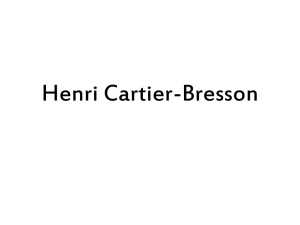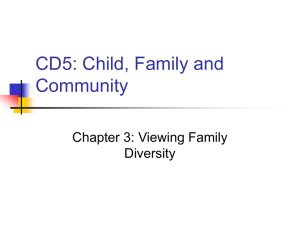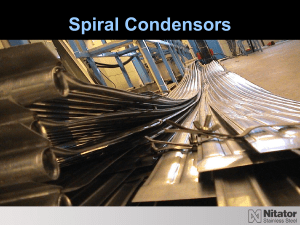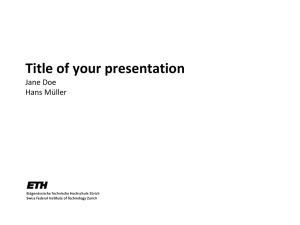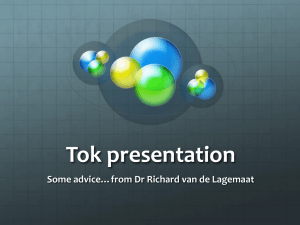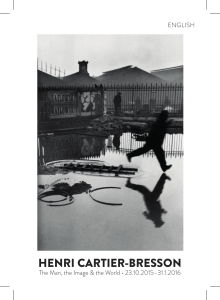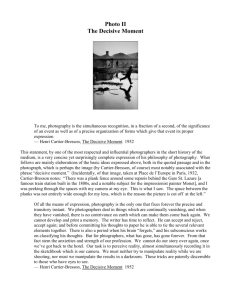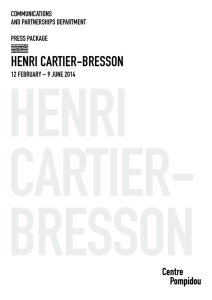Document
advertisement
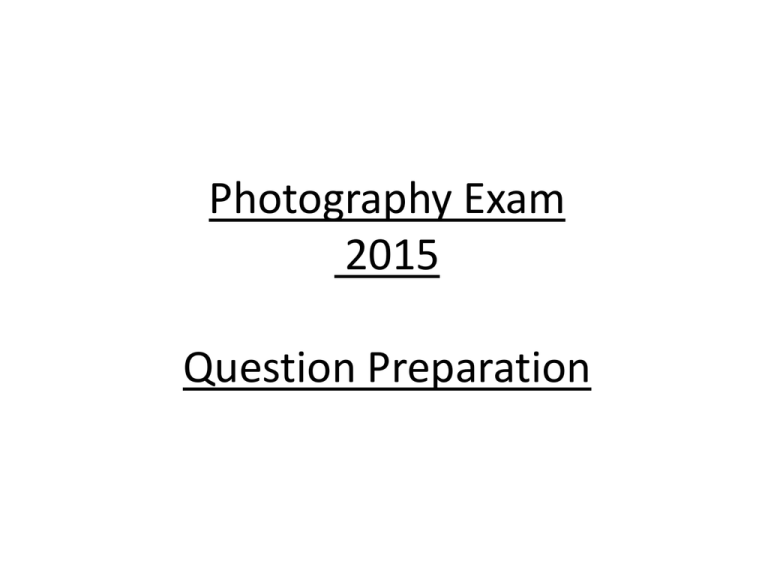
Photography Exam 2015 Question Preparation The following slides are for the exam questions recommended by Mr Inglis/Mrs Archer for the exam Make Sure You - have a title slide - type in the question - research named photographers but should add your own – at least 4 in total 1. Food • Nickolas Muray pioneered the advertising of food products using colour photography. Clare Barboza and David Loftus both specialise in photographing food. They creatively explore the visual qualities of food using selective focus by controlling depth of field and camera position. They carefully choose viewpoint, lighting and setting to display the prepared dishes and ingredients. • Research appropriate sources and produce your own images that explore the visual qualities of Food. Nickolas Muray Close up Intense contrast of colour Use layer settings and alter the opacity. Human interaction with food Symmetry ‘Vintage’ look Consider the background the photographs retain a vibrancy close to the way they appeared some seventy-five years ago, thanks to built-up layers of pigments and the lack of any tarnishing silver halides. Clare Barboza Close up Intense contrast of colour Think about the ‘stage set’ Focal point Reflections Shallow depth of field Repetition Camera position Cropped Images High contrast but natural Think of the skills learnt from your CLOSE UP project & the Chocolate photo shoot David Loftus Close up Intense contrast of colour Focal point Shallow depth of field Camera position - Tripod David has done a lot of Jamie Oliver’s cook book photos Enhancing the colours How do the surroundings affect the style of imagery? 2. Fantastic and strange • Many photographers and filmmakers create fantastic and strange images. Mari Mahr and Jerry Uelsmann made surreal images using double exposure and overprinting. More recently, Igor Morski used digital technology to produce surreal images for his graphic products, and Penny Jensz uses mixed media with photographs to create fantastic and strange portraits. In ‘A Game with Stones” by Jan Svanmajer and ‘Canon’ by Norman Mclaren, stop-frame animation is combined with film to produce fantastic and strange sequences. • Investigate relevant sources and create your own response to Fantastic and strange. Mari Mahr Could you print out images to create a fantastic effect? Think about the use of layers in Photoshop to create the ‘weird’ look Do they have to be B&W or can you keep the same contrast in colour? Jerry Uelsmann Combination of close up & distance shots Think about the set up of the photoshoot to create the final layered effect • • • • Photoshop Layers Clipping paths High contrast (B&W or colour?) Depth of Field Igor Morski Combination of make up & Photoshop work – how could you do it? How could you combine images and create the ‘painting’ look? Could artwork be used? Ie. Painting, hand sketches? Then scanned in Penny Jensz Mixed media – photographs, prints, layers, pen & ink Could artwork be used? Ie. Painting, hand sketches? Then scanned in Background kept simple, focus on the portrait. Portrait starts ‘normal’ before being edited. 4. The human condition • Many photographers, such as Henri Cartier-Bresson, Sandra Eleta, Dorothea Lange and Peter Turnley, capture a moment in time that expresses emotion or records an event that is part of the rich variety of our human experience. Sometimes, they explore how we relate to others and moments that are important to us. • Investigate relevant sources and produce your own work in response to one of the following: • companionship • achievement • relaxation Henri Cartier-Bresson, Notice how Cartier-Bressons photos capture a moment in time, events, how people relate to each other. Henri Cartier-Bresson Notice how Cartier-Bressons photos capture a moment in time, events, how people relate to each other. Henri Cartier-Bresson Notice how CartierBressons photos capture a moment in time, events, how people relate to each other. Notice how Eletas photos story captured in a moment in time, events, how people relate to each other. Sandra Eleta, Notice how Langes photos capture a moment in time, events, how people relate to each other. Dorothea Lange Peter Turnley, Notice how Turnleys photos capture a moment in time, events, how people relate to each other. Now decide on one of these categories and do a spider diagram to plan out the project – some thoughts in italics • companionship – think of different generations, genres, relationships with pets? • achievement – celebrations? birthdays, sport/music/dance awards, certificates etc • relaxation – leisure activities outside e.g. walking, climbing, any sport, inside shopping at Meadowhall? parties? family occasions 6. Spirals Photographers are often inspired by the qualities and characteristics of spiral forms. Andy Goldsworthy has created spirals in the natural environment and photographed the results. Yuval Cadmon has photographed spiral forms by recording the movement of light. Many photographers produced images of spiral forms found in architecture. Research appropriate sources and produce your own work inspired by Spirals. Would be a good idea to do both of the following…. Andy Goldsworthy has created spirals in the natural environment and photographed the results. Andy Goldsworthy Andy Goldsworthy has created spirals in the natural environment and photographed the results. Collected some natural materials together then.. …look to make your own then photograph them by a. practising indoors, in the garden, b. outdoors maybe in a variety of locations Yuval Cadmon Yuval Cadmon has photographed spiral forms by recording the movement of light Yuval Cadmon has photographed spiral forms by recording the movement of light. Experiment with a range of light sources that can re-create the spiral shapes that Cadmon takes photos of. Think of; the size of the light source, e.g. torch – some have variable beams, lamp, led lights multiple uses of the same light sources, e.g. led lights can be used collectively like xmas lights blackout where appropriate, using models to help create. experiment with different exposure times to get different effects.

